We may have some rough storms here too, but things look especially dangerous for some of our neighbors to the West later today.
And there is some scuttlebutt going around about whether or not SPC will upgrade this to the rare High Level 5 out of 5 Risk or not. I don't really care if they do or don't. The message is essentially the same: This looks like a potential tornado outbreak for the Mississippi River Valley, and one where we could have some particularly damaging (and thus dangerous) tornadoes. Back in 2011, a lot of people were upset that April 15th was only a Moderate Risk (and back then, that was a Level 2 out of 3 - things have changed as far as jargon and categories and flashy colors over the years). It was a significant tornado outbreak for Central and South Alabama, also several tornadoes back in Mississippi if I recall correctly, I think North Alabama and into Tennessee mainly had flooding problems that day, the air was stabler. Let's not get hung up on technicalities, can always fight about those later. On a day like today, the important thing is to protect life. With or without the absolute highest risk level being forecast, we know that this is serious business.
ZCZC SPCPWOSPC ALL
WOUS40 KWNS 240622
ARZ000-LAZ000-MOZ000-MSZ000-TNZ000-241800-
PUBLIC SEVERE WEATHER OUTLOOK
NWS STORM PREDICTION CENTER NORMAN OK
0122 AM CDT FRI MAR 24 2023
...Severe thunderstorms expected over parts of the lower Mississippi
Valley this afternoon and tonight...
* LOCATIONS...
Northern and central Mississippi
Central and eastern Arkansas
Northern Louisiana
Western Tennessee
Missouri Bootheel
* HAZARDS...
Several tornadoes, a few intense
Scattered damaging winds, some hurricane force
Isolated large hail
* SUMMARY...
An outbreak of severe weather is expected across the Lower
Mississippi Valley this afternoon and evening. Tornadoes, some
strong to potentially intense, as well as damaging winds and
hail are expected.
Preparedness actions...
Review your severe weather safety procedures for the possibility
of dangerous weather today. Stay tuned to NOAA Weather Radio,
weather.gov, or other media for watches and warnings. A tornado
watch means that conditions are favorable for tornadoes to form
during the next several hours. If a tornado warning is issued for
your area, move to a place of safety, ideally in a basement or
interior room on the lowest floor of a sturdy building.
&&
..Grams.. 03/24/2023
$$
SPC AC 240556

Day 1 Convective Outlook
NWS Storm Prediction Center Norman OK
1256 AM CDT Fri Mar 24 2023
Valid 241200Z - 251200Z
...THERE IS A MODERATE RISK OF SEVERE THUNDERSTORMS ACROSS PORTIONS
OF THE MID-MISSISSIPPI VALLEY...
...SUMMARY...
An outbreak of severe weather is expected from the Lower Mississippi
Valley toward the lower Ohio Valley Friday afternoon and evening.
Tornadoes, strong to potentially intense, as well as damaging winds
and hail are expected.
***Tornado Outbreak Possible Across Portions of the Mid Mississippi
Valley Friday Evening***
...Synopsis...
A mid-level trough can be seen on water vapor east of the northern
Baja Peninsula this morning. This trough will move quickly across
the southern Plains through the day and into the Mid
Mississippi/Lower Ohio Valley by Saturday morning. A very strong
mid-level jet (90-100 knots) will develop as this wave impinges on a
strong upper-level High across the Southeast.
Broad warm air advection is expected across the Mid-Mississippi
Valley during the day Friday with a strengthening low-level jet
through the day. Significant mass response is expected across this
area by early evening as the mid-level trough approaches the area.
As a result, the surface low will deepen rapidly between 00Z to 06Z
to around 992-994mb in the southern Illinois/Indiana vicinity.
During this period of rapid deepening, a warm front which is
forecast to be mostly stationary from northeast Arkansas to central
Tennessee during most of the day, will start to move quickly north
during the late afternoon with the northern extent of the warm
sector depicted by the approximate path of the surface low.
...Mid Mississippi Valley...
Thunderstorms will be ongoing at the beginning of the period across
eastern Oklahoma and western Arkansas. Some embedded supercells are
possible with the threat for a few weak tornadoes. Most guidance is
consistent with the convectively enhanced cold front drifting south
into north-central/northeast Arkansas in the morning. Therefore,
this early activity will likely wane as it interacts with this
southward moving front by late morning.
A pocket of drier air can be seen on water vapor moving north in the
west-central Gulf early this morning. This is associated with a
relative minimum in PWAT which will overspread eastern Louisiana and
much of Mississippi during the late morning and through the
afternoon. This seems to be responsible for the significant mixing
and surface dewpoint reductions seen my much of the guidance across
Mississippi in the afternoon where temperatures warm into low 80s.
However, despite this drier air further east, deep moisture will
remain across the western Gulf and will advect northward into
Louisiana during the afternoon as low-level mass response increases.
By mid to late afternoon, upper 60s to potentially low 70s dewpoints
are expected across northern Louisiana and eastern Arkansas,
spreading into northern Mississippi by the evening. This will lead
to an uncapped warm sector featuring MLCAPE of 500-1000 J/kg up the
Mississippi River to near Memphis and 1500-2000 J/kg farther south
across northern Louisiana and west-central Mississippi.
Expect storms to strengthen during the afternoon as the better
moisture advects northward and destabilizes the airmass ahead of
ongoing activity. CAM guidance is in agreement for a strong QLCS to
develop from central to northern Arkansas during the afternoon. This
line of storms will pose a threat for damaging wind and QLCS
tornadoes given the long, curved low-level hodographs with the best
overlap of favorable shear and instability in the vicinity of the
Mississippi River. This line of storms will eventually outrun the
better instability as it moves toward Middle Tennessee/southern
Kentucky, but the strong low-level jet (~70 kts), and strong forcing
with the deepening surface cyclone will help to maintain some severe
threat well into the overnight despite progressively more meager
instability.
Across southeast Arkansas, northern Louisiana, and northwest
Mississippi, a more volatile environment will develop Friday
evening/early overnight. More discrete convection is anticipated on
the southern periphery of the aforementioned QLCS. The more discrete
mode, combined with greater instability and strong shear should
allow for multiple supercells to develop across northern Louisiana
and southern Arkansas and move northeastward. Low-level hodographs
are very favorable in this region with 0-500m SRH around 200 m2/s2
and 0-1km SRH 300+ m2/s2. Therefore, any sustained supercells will
be capable of producing strong to intense (EF3+) tornadoes, with
long-track tornadoes possible with any longer-lived, undisturbed
supercells.
00Z HREF members showed a variety of solutions which cast some
uncertainty on the forecast. WRF members are notably less bullish
with warm sector supercell development from northeast Louisiana into
northern Mississippi while the HRRR was most aggressive with
convective coverage and environment. After further investigation it
appears the more aggressive HRRR solution can be attributed to a
more robust mass response during the afternoon/early evening hours.
This results in a pronounced shortwave trough which can be seen at
700 and 850mb and reflected as a significant confluence zone at the
surface. Not only does this act as a forcing for storm development,
but it also acts as moisture convergence with a more broad region of
70+F dewpoints. In this scenario, numerous strong tornadoes would be
likely, with the potential for several intense tornadoes. Despite
being the most aggressive, this solution does not seem unreasonable
as similar low-level confluence features can been on both the 00Z
GFS and the 18Z ECMWF.
As is often the case, the severity of the tornado threat across the
moderate risk will be modulated by mesoscale influences in the
region. As the event approaches, these mesoscale effects may become
more clear and allow the greatest risk corridor to become better
defined.
..Bentley/Weinman.. 03/24/2023
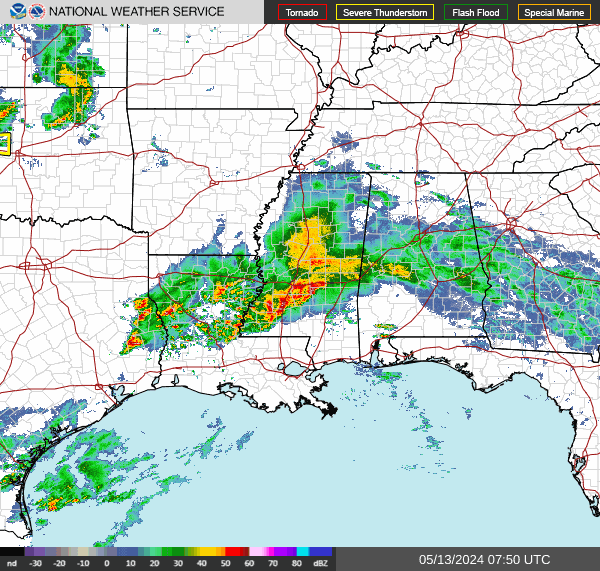
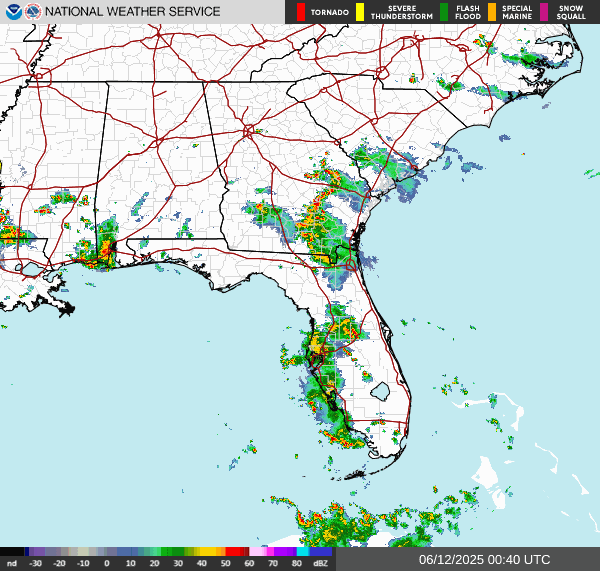
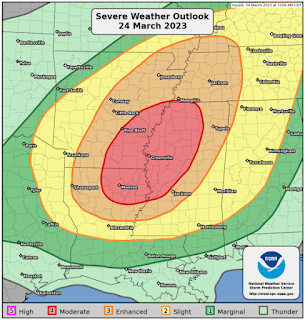



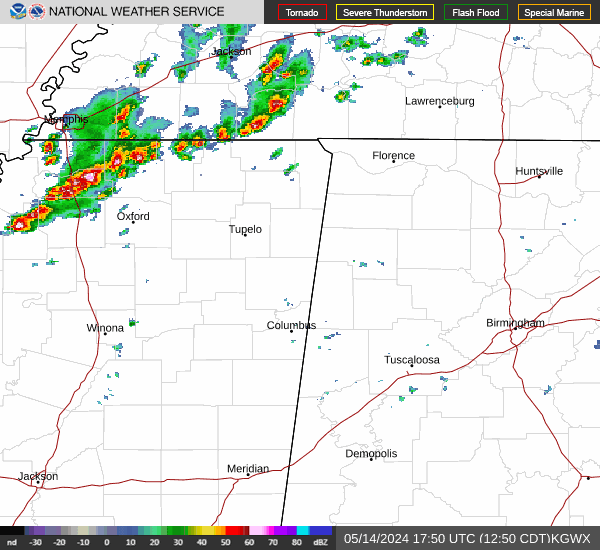
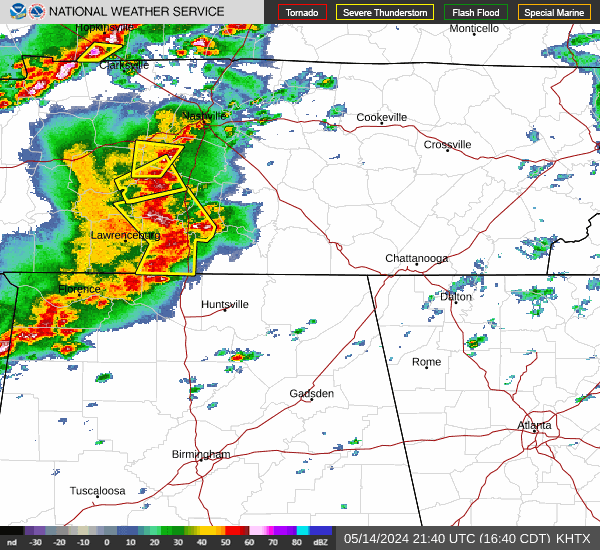
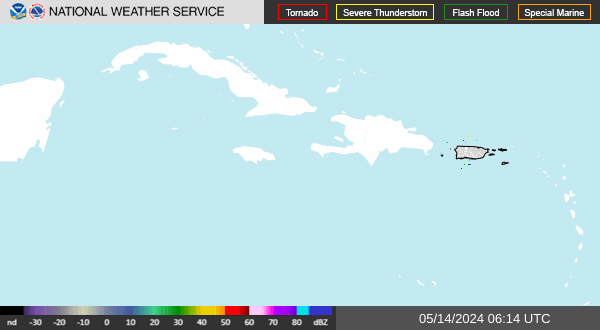



No comments:
Post a Comment